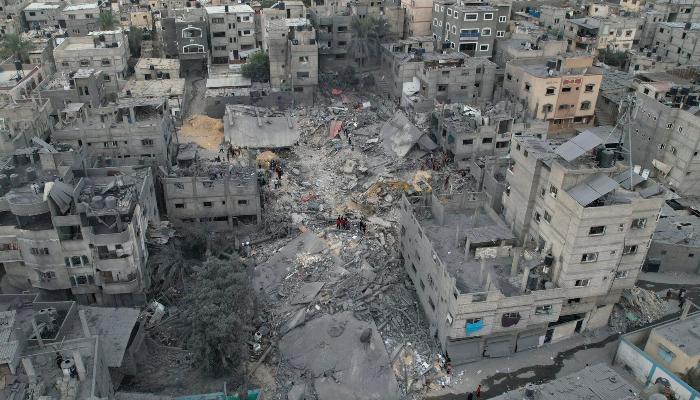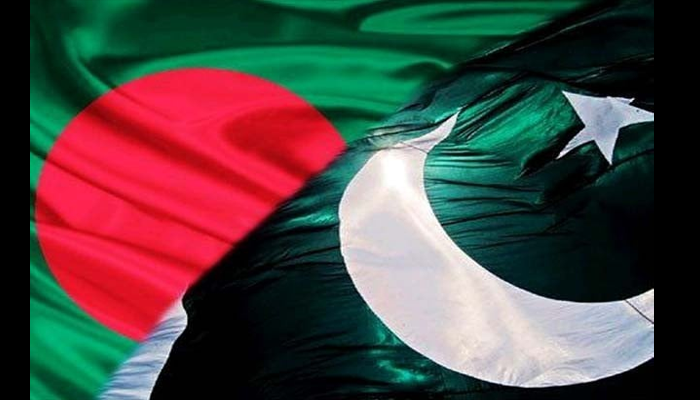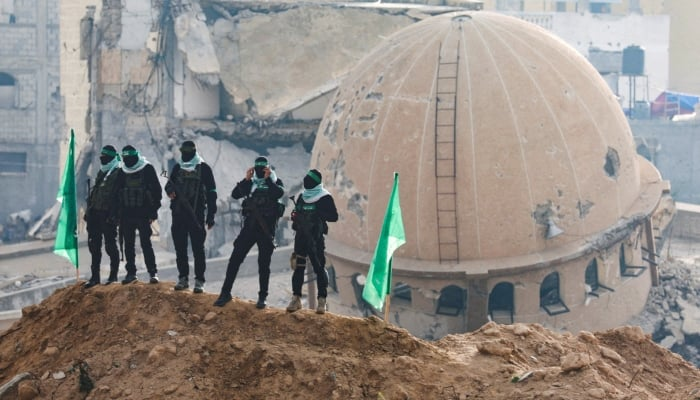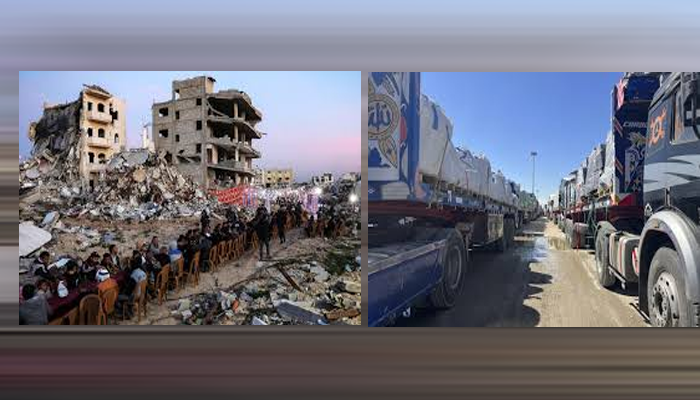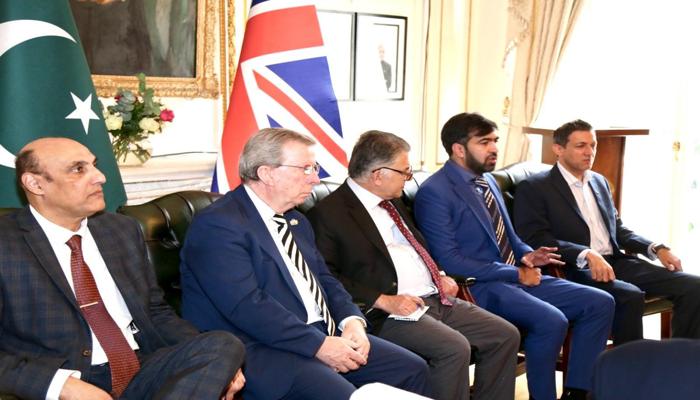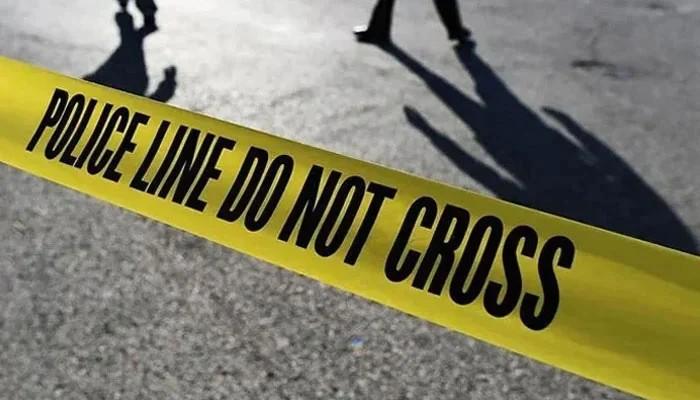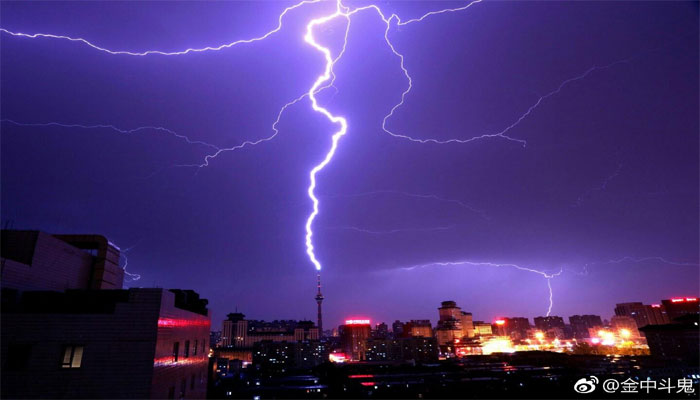Israeli troops backed by tanks pressed into northern Gaza on Monday, conducting intense air and artillery strikes on Palestinians amid louder international calls for civilian protection.
The strikes targeted areas near Gaza City's Al-Shifa and Al-Quds hospitals, while Hamas fighters clashed with Israeli forces in a border area east of Khan Younis, according to Palestinian media.
After the Israeli government ordered additional ground incursions across Gaza's eastern border two days earlier, the Israeli government released photographs of war tanks on the western coast of the Palestinian enclave, hinting at a possible attempt to surround the city. This was followed by the bombardment of Gaza for many hours.
Israel's army said a new "stage" of the war started with ground incursions since late Friday, an escalation from two brief operations earlier in the week. However, this phase has largely been kept from public view, with forces moving under darkness and a telecommunications blackout cutting off Palestinians.
According to AFP, telecommunication cuts appeared to ease on Sunday but had severely hampered rescue operations for casualties of Israeli barrages.
Evacuation warnings to Al Quds, Al Shifa Hospital
The reported strikes near hospitals came after the Palestinian Red Crescent Society (PCRS) said on Sunday that it had received warnings from Israeli authorities to immediately evacuate al-Quds hospital, where some 14,000 people have sought shelter.
Mohamed al-Talmas, who has taken shelter in Gaza's biggest hospital Shifa, said "the ground shook" with intense Israeli raids.
"No one knew where they (strikes) were coming from — north, south, east or west."
Israel has accused Hamas of locating command centres and other military infrastructure in Gaza hospitals, something the group denies.
Palestinian officials said around 50,000 people had also taken shelter in Shifa Hospital, adding that they were concerned about ongoing Israeli threats to the facility.
Israel has tightened its blockade and bombarded Gaza since Hamas gunmen stormed across the border into Israel on October 7, killing some 1,400 people and taking at least 239 hostages, according to Israeli reports.
Meanwhile, as a result of Israeli retaliatory strikes, over 8,000 Palestinians have been martyred including more than 3,000 children.
Panic and fear have surged inside the Palestinian territory, where the UN says more than half of its 2.4 million residents are displaced and thousands of buildings destroyed.
Hamas's armed wing, the Ezzedine al-Qassam Brigades, said on Sunday its fighters were "engaged in heavy fighting... with the invading occupation (Israeli) forces in northwest Gaza".
Aid 'acceleration'
In a phone call with Israeli Prime Minister Benjamin Netanyahu on Sunday, US President Joe Biden "underscored the need to immediately and significantly increase the flow of humanitarian assistance to meet the needs of civilians in Gaza", according to a readout of the conversation from the White House.
Additionally, in a separate call with President Abdel Fattah al-Sisi of Egypt, which borders Gaza to the south, the two leaders "committed to the significant acceleration and increase of assistance", the White House said.
UN chief Antonio Guterres said the situation was "growing more desperate by the hour" as casualties increase and essential supplies of food, water, medicine and shelter dwindle.
The UN agency for Palestinian refugees, UNRWA, warned that "civil order" was starting to collapse as "thousands of people" broke into several of its warehouses and distribution centres in Gaza, grabbing basic items like flour and hygiene supplies.
"This is a worrying sign that civil order is starting to break down," it said.
A US government official, speaking on condition of anonymity, said earlier Israel was committed to allowing 100 aid trucks into Gaza daily — a figure the UN has said was needed to meet the most basic needs.
US urges Israel to protect Gaza civilians
The bloodshed saw the Biden administration warn Israel on Sunday that it must protect civilian lives.
While the US ally has the right to defend itself, it must do so "in a manner consistent with international humanitarian law that prioritises the protection of civilians," Biden told Netanyahu in a phone call, the White House said.
He spoke after his national security adviser, Jake Sullivan, told CNN that Israel "should be taking every possible means available to them to distinguish between Hamas — terrorists, who are legitimate military targets — and civilians, who are not."
Moreover, Britain's Prime Minister Rishi Sunak and French President Emmanuel Macron "stressed the importance of getting urgent humanitarian support" into the Palestinian territory.
Sunak and Macron spoke by telephone and "agreed to work together on efforts both to get crucial food, fuel, water and medicine to those who need it and to get foreign nationals out," said a Downing Street spokesperson.
On social media, Macron reiterated a call for a humanitarian truce.
"17 tons of humanitarian freight have arrived in Egypt from France. We are continuing our efforts by air and sea... alongside Egypt and the Red Crescent," he said.
Earlier, Guterres said he regretted that "instead of a critically needed humanitarian pause, supported by the international community, Israel has intensified its military operations."
"The world is witnessing a humanitarian catastrophe," Guterres added on a visit to Nepal's capital Kathmandu. "I urge all those with responsibility to step back from the brink."
Working to free hostages
Though the US remains Israel's strongest ally, the Biden administration has insisted that Israeli leaders alone decide its military operations and publicly multiplied appeals to spare the lives of Palestinian civilians.
The White House also revealed Sunday that it had "worked on" bids to turn communications in Gaza back on.
The restoration of communications was "critical," the official White House account posted on X, formerly Twitter.
"Aid workers, civilians, and journalists need to be able to communicate with each other and the rest of the world. Our Administration cared about this, worked on it, and are glad to see it restored," the post continued.
Sullivan, speaking on ABC's "This Week" as he made a round of Sunday talk shows, slammed Hamas's own treatment of civilians, calling them a "brutal terrorist organisation" that is "hiding behind the civilian population."
"But it doesn't lessen their (Israel's) responsibility under international humanitarian law and the laws of war to do all in their power to protect the civilian population," he said.
Sullivan also said that US officials are working to help secure the release of more than 220 hostages being held in Gaza by Hamas, as well as to help the hundreds of Palestinian Americans stuck in Gaza.
'All areas are dangerous'
Israel's military said Sunday that it had struck hundreds of Hamas targets and increased its ground forces in Gaza. Military spokesman Hagari vowed to "chase down" Hamas's leader in Gaza, Yahya Sinwar.
The army said troops had "confronted" Hamas fighters who emerged out of a tunnel in north Gaza, highlighting challenges in Hamas's vast underground network to Israel's ground operation.
In a late-night televised address on Saturday, Netanyahu announced a "second stage of the war" to "eradicate" Hamas, which has governed Gaza since 2007.
Communications were down in Gaza after Israel cut internet lines ahead of the intensification of its operations, although connectivity was gradually returning on Sunday.
The "burden" lies with Israel to distinguish between Hamas and innocent civilians in Gaza, US National Security Advisor Jake Sullivan told CNN television.
Hagari again urged Palestinian civilians to go south "to a safer area", but residents remained wary as airstrikes continued.
Ibrahim Shandoughli, a 53-year-old from Jabaliya in northern Gaza, told AFP he and his family went nowhere.
"Where do you want us to evacuate to? All the areas are dangerous."

